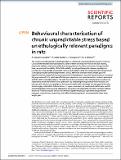Mostrar el registro sencillo del ítem
Behavioural characterisation of chronic unpredictable stress based on ethologically relevant paradigms in rats
| dc.creator | Sequeira Cordero, Andrey | |
| dc.creator | Salas Bastos, Adrián | |
| dc.creator | Fornaguera Trías, Jaime | |
| dc.creator | Brenes Sáenz, Juan Carlos | |
| dc.date.accessioned | 2020-01-07T16:42:03Z | |
| dc.date.available | 2020-01-07T16:42:03Z | |
| dc.date.issued | 2019-11 | |
| dc.identifier.citation | https://doi.org/10.1038/s41598-019-53624-1 | |
| dc.identifier.issn | 2045-2322 | |
| dc.identifier.uri | https://hdl.handle.net/10669/80197 | |
| dc.description.abstract | The chronic unpredictable stress (CUS) paradigm is extensively used in preclinical research. However, CUS exhibits translational inconsistencies, some of them resulting from the use of adult rodents, despite the evidence that vulnerability for many psychiatric disorders accumulates during early life. Here, we assessed the validity of the CUS model by including ethologically-relevant paradigms in juvenile rats. Thus, socially-isolated (SI) rats were submitted to CUS and compared with SI (experiment 1) and group-housed controls (experiment 1 and 2). We found that lower body-weight gain and hyperlocomotion, instead of sucrose consumption and preference, were the best parameters to monitor the progression of CUS, which also afected gene expression and neurotransmitter contents associated with that cUS-related phenotype. the behavioural characterisation after cUS placed locomotion and exploratory activity as the best stress predictors. By employing the exploratory factor analysis, we reduced each behavioural paradigm to few latent variables which clustered into two general domains that strongly predicted the CUS condition: (1) hyper-responsivity to novelty and mild threats, and (2) anxiety/depressive-like response. Altogether, the analyses of observable and latent variables indicate that early-life stress impairs the arousal-inhibition system leading to augmented and persistent responses towards novel, rewarding, and mildly-threatening stimuli, accompanied by lower bodyweight gain. | es_ES |
| dc.description.sponsorship | Universidad de Costa Rica/[742-B4-240]/UCR/Costa Rica | es_ES |
| dc.description.sponsorship | Universidad de Costa Rica/[742-B3-220]/UCR/Costa Rica | es_ES |
| dc.language.iso | en_US | es_ES |
| dc.source | Scientific Reports, vol.9, Article number: 17403 | es_ES |
| dc.subject | Chronic unpredictable stress | es_ES |
| dc.subject | Behaviour | es_ES |
| dc.subject | Rats | es_ES |
| dc.subject | Preclinical studies | es_ES |
| dc.title | Behavioural characterisation of chronic unpredictable stress based on ethologically relevant paradigms in rats | es_ES |
| dc.type | artículo original | |
| dc.identifier.doi | 10.1038/s41598-019-53624-1 | |
| dc.description.procedence | UCR::Vicerrectoría de Investigación::Unidades de Investigación::Ciencias de la Salud::Centro de Investigación en Neurociencias (CIN) | es_ES |
| dc.description.procedence | UCR::Vicerrectoría de Investigación::Unidades de Investigación::Ciencias Sociales::Instituto de Investigaciones Psicológicas (IIP) | es_ES |
| dc.description.procedence | UCR::Vicerrectoría de Investigación::Unidades de Investigación::Ciencias de la Salud::Instituto de Investigaciones en Salud (INISA) | es_ES |
| dc.description.procedence | UCR::Vicerrectoría de Docencia::Salud::Facultad de Medicina | es_ES |
| dc.identifier.codproyecto | 742-B4-240 | |
| dc.identifier.codproyecto | 742-B3-220 |


